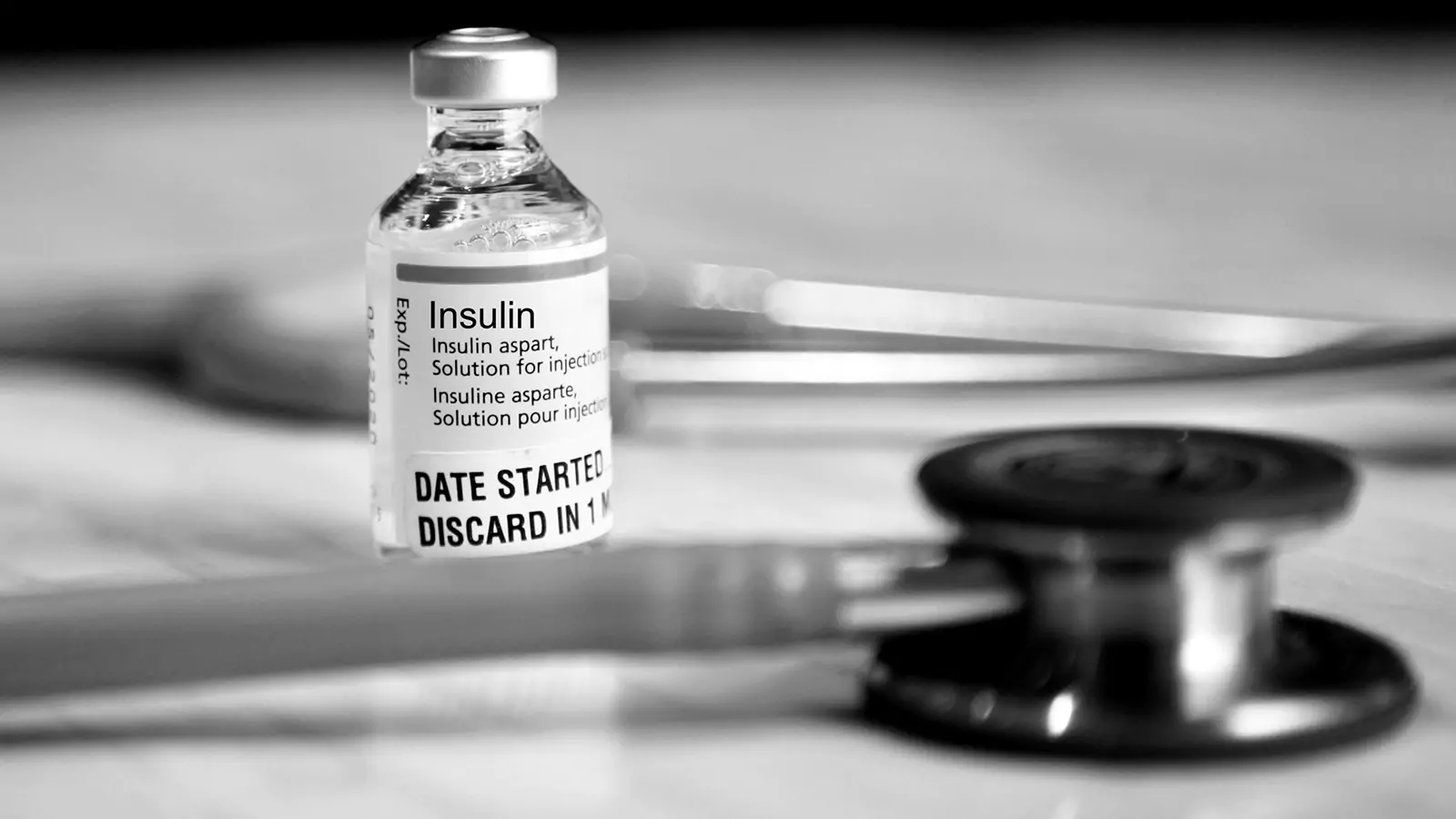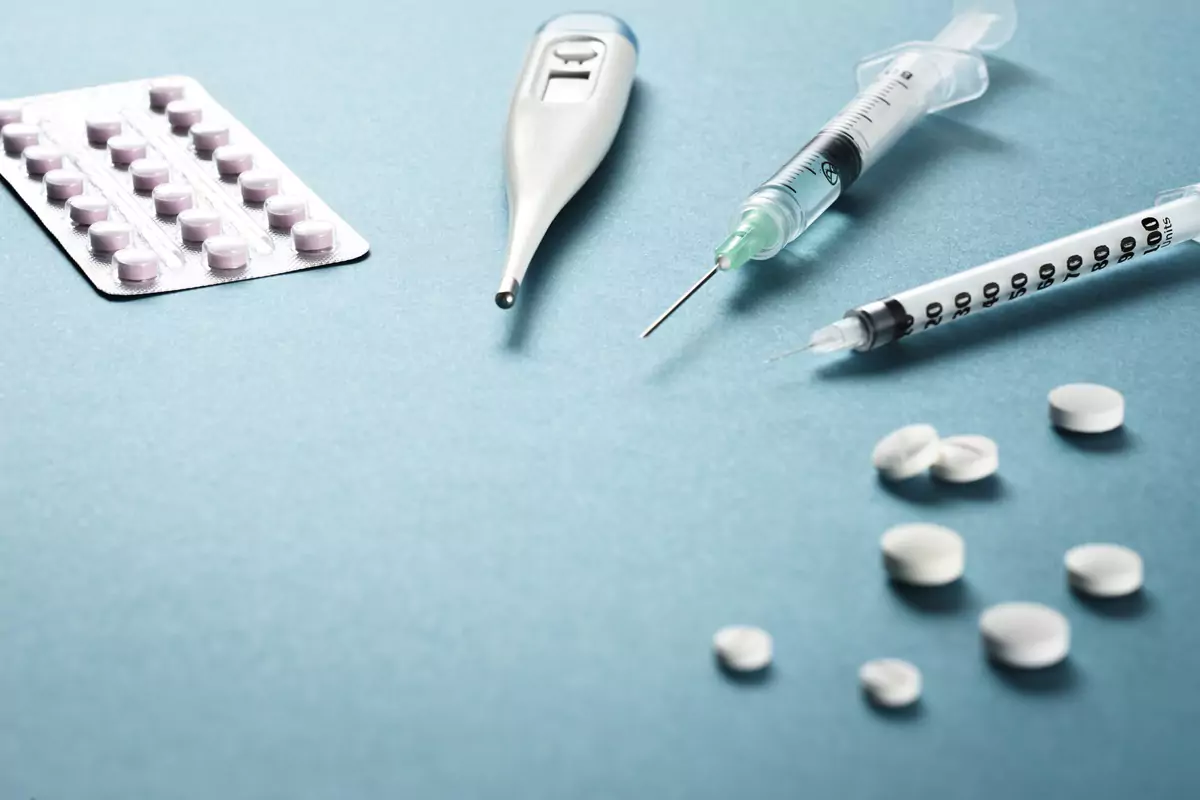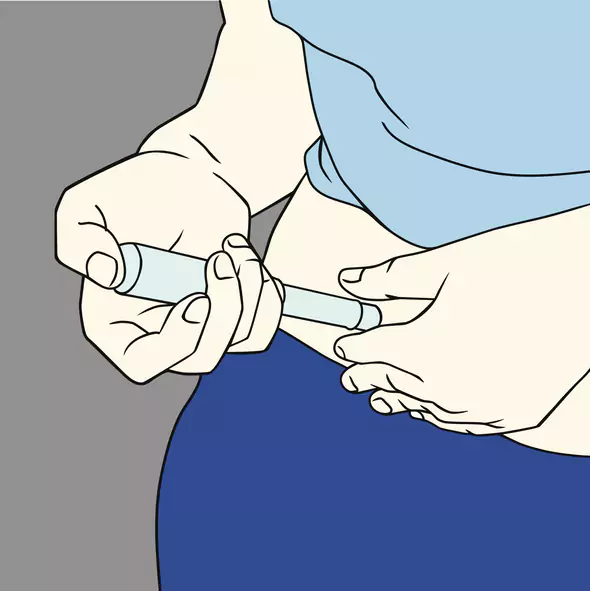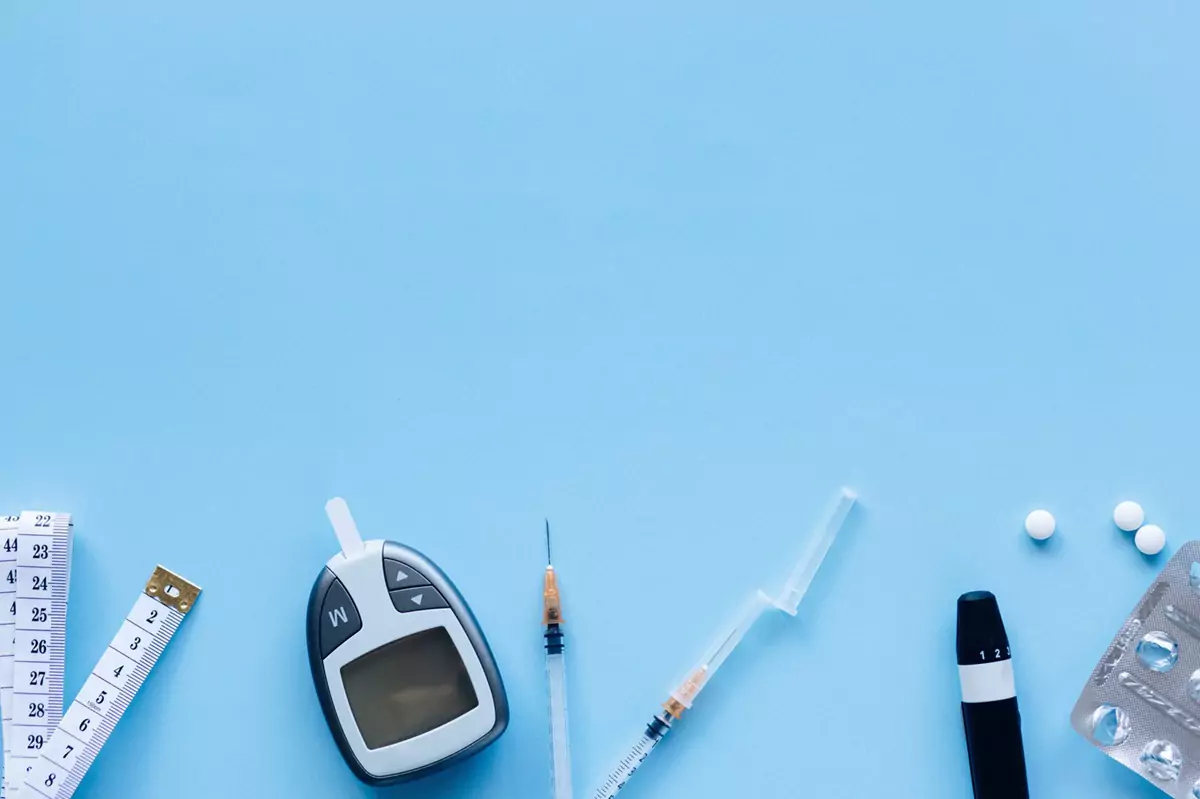
UP TO 40% OFF SITEWIDE






7 Signs of Insulin Shock, Their Causes & Treatments


Table of Contents
- What is Insulin Shock?
- How does insulin work?
- 7 Signs of Insulin Shock
- Feeling Weak or Fatigued
- Trembling or Shaking
- Sweating
- Dizziness or Lightheadedness
- Rapid Heartbeat
- Confusion and Disorientation
- Loss of Consciousness
- Common Causes of Insulin Shock
- Taking too much medication or insulin
- Skipping meals or fasting for too long
- Inadequate carbohydrate intake
- Effects Insulin Shock Have on the Body
- Disorientation
- Shakiness
- Loss of Consciousness
- Treatment for Insulin Shock
- 3 Foods for Insulin Shock
- 2 Best Supplements for Insulin Shock
- How to prevent insulin shock
- Conclusion
- About The Author
Insulin shock is a serious medical condition that can cause life-threatening symptoms if left untreated. It is caused by abnormally low blood sugar levels caused by an excess of insulin in the body. In this article, we will discuss 7 signs and symptoms of insulin shock, their causes, and how to treat it.
We will also cover preventive measures you can take to reduce your risk of insulin shock, as well as the best foods, supplements, and other treatments that can be helpful. Read on to learn more about insulin shock, its causes, and treatments.
What is Insulin Shock?
Insulin shock is a medical emergency that occurs when a person's blood sugar drops extremely low (severe hypoglycemia) when you have too much insulin in your blood. When this occurs, it is important to act quickly in order to avoid serious health risks.
Common signs of insulin shock include sweating, confusion, hunger, lightheadedness, difficulty speaking, fainting, and seizure. It is also important to note that symptoms can vary based on the individual and the severity of the shock. The most common cause of insulin shock is mismanagement of insulin therapy, which can happen due to improper dosing, incorrect timing, meal skipping, or physical activities exceeding what is recommended by the medical treatment plan.
Other causes can include major stressors on the body, such as infection or severe physical injury, as well as illnesses and other medications that can interfere with insulin production or absorption. If insulin shock is suspected, the individual should be moved to a safe area, their head should be kept lower than the heart, and attempts should be made to raise their blood sugar.
This can be done by consuming simple carbohydrates such as juice, candy, or a sugared drink. If the individual is unable to take food or drink, medical professionals should be contacted immediately. It is also important to note that insulin shock can be prevented through careful monitoring, management, and adherence to an insulin therapy plan.
It is important to pay attention to the warning signs and to be aware of the ways in which insulin shock can be avoided. With proper medical care and attention, symptoms of insulin shock can be quickly managed and reversed.
How does insulin work?
Insulin is a hormone that is secreted by the pancreas, responsible for regulating blood sugar levels. It helps the body to use glucose, the body’s main source of energy, to keep up with demand. The body then absorbs glucose from food and transports it to cells, where it is converted into energy.
While this process helps the body maintain a healthy blood sugar level, it can go wrong when the body receives too much insulin. Too much insulin can cause blood sugar levels to drop too low, leading to insulin shock.
7 Signs of Insulin Shock
Insulin shock, also known as hypoglycemia, or an insulin reaction, can be caused by many factors, including the overuse of insulin, missed meals, intense physical activity, and alcohol consumption. It is crucial to recognize the signs of insulin shock and take the appropriate steps to treat it, as it can be life-threatening. Below are seven signs of insulin shock, along with their potential causes and treatments.
Feeling Weak or Fatigued
Feeling weak or fatigued is one of the most commonly reported symptoms of insulin shock. If you are feeling weak or fatigued, it is important to take immediate action in order to avoid more serious health complications, such as loss of consciousness or seizures. If you are feeling weak or fatigued, it is important to check your blood sugar levels.
After confirming that your blood sugar levels are low, you should immediately consume carbohydrates, such as fruit juice, in order to raise your blood sugar levels. If you are unable to consume carbohydrates and your symptoms of insulin shock persist, you should seek medical attention immediately.
Your physician can provide you with appropriate treatments for insulin shock, including intravenous fluids and glucose, as well as medications to raise your blood sugar levels. It is important to monitor your blood sugar closely and take steps to ensure that your insulin levels remain in balance.
Trembling or Shaking
Trembling or shaking can be one of the signs of insulin shock. People experiencing insulin shock can exhibit a wide range of symptoms, including trembling or shaking. The trembling or shaking that occurs in insulin shock is caused by changes in the body’s blood sugar levels. When the blood sugar level is too low, the body responds by releasing hormones such as epinephrine and norepinephrine, which can cause trembling or shaking.
If the blood sugar levels remain low severe trembling and shaking can occur. In severe hypoglycemia, the person may experience seizures or unconsciousness. It is important to monitor blood sugar levels in those at risk of insulin shock, as it is usually the first sign that something is wrong.
People with diabetes should check their blood sugar levels frequently throughout the day, and if the levels are low, they should act quickly by consuming something sweet, such as juice or honey, to raise the sugar levels. If trembling or shaking persists after consuming sugar, or if it is accompanied by other symptoms such as nausea, dizziness, confusion, or fatigue, it is best to seek medical attention immediately to avoid a more serious medical emergency.
It is important to be aware of the signs of insulin shock. If you experience trembling or shaking, it is important to seek medical attention immediately in order to avoid any potential complications. Be sure to include the keywords insulin shock in any discussion with your doctor so that you can get the most accurate diagnosis and treatment.
Sweating
When a person with diabetes experiences insulin shock, their body may respond by producing excessive amounts of sweat. This can happen even when the person isn't participating in strenuous physical activity or in a warm room. In some cases, the person may experience a cold sweat as well.
The symptoms of insulin shock can range from mild to extreme. Sweating can be one of the more common symptoms and should be monitored for any time a person is taking insulin, as it is one of the earliest indicators of a potential issue.
If a person notices that they are suddenly sweating more than usual and feel otherwise unwell, they should check their blood sugar level or get medical help. Treatment for insulin shock should be provided as soon as a person notices the symptoms.
The person should stop taking any additional insulin they may have taken and should snack on something to raise their blood sugar levels. If their symptoms don't abate, they should seek medical help right away. If left untreated, insulin shock can lead to coma or death.
Dizziness or Lightheadedness
When the body has low blood glucose, it can cause dizziness or lightheadedness due to reduced circulation to the brain. This can lead to severe hypoglycemia, causing fainting, confusion, or seizures. Treating lightheadedness or dizziness associated with insulin shock is done by restoring normal blood sugar levels.
This can be done by consuming sugars or carbohydrates, such as candy, juice, or sugary drinks, which will raise person blood sugar levels. If the person is unable to consume sugars, then an injection of glucagon may be necessary to raise the blood sugar levels.
It is important that someone who is experiencing lightheadedness or dizziness due to insulin shock receives medical attention if these symptoms do not subside after consuming sugars or carbohydrates. Inadequate glucose delivery to the brain and nerve cells is usually responsible for the symptoms of dizziness or lightheadedness associated with insulin shock.
It is important for someone who is experiencing these symptoms to seek medical help as soon as possible. If left untreated, insulin shock can lead to more serious circumstances such as coma or death. Treatment of lightheadedness or dizziness associated with insulin shock should begin by consuming sugars or carbohydrates, and if these do not help then medical attention should be sought.
Rapid Heartbeat
Rapid heartbeat is one of the most common signs of insulin shock. It can be an early indicator of insulin shock; other symptoms may include confusion, dizziness, hunger, sweating, anxiety, and a pale or flushed appearance. There are a number of potential causes of insulin shock, including a reaction to a medication, a lack of food or water, excessive alcohol consumption, an infection, and an imbalance in hormones.
Medical personnel might also give intravenous fluids to help stabilize the patient’s blood pressure. It is important to seek medical attention as soon as possible if you suspect you or someone else is experiencing insulin shock. If you or someone else is experiencing rapid heartbeat or any of the other symptoms of insulin shock, seek medical attention immediately.
Confusion and Disorientation
The key symptom of insulin shock is confusion and disorientation, which can manifest itself as a confused mental state, or even disorientation and confusion in relation to surroundings. Patients may also experience disorientation regarding time, date, and place. A person may have difficulty naming objects or even familiar family members.
These mental changes can be accompanied by physical symptoms, such as dizziness, sweating, difficulty breathing, nausea, and a rapid heart rate. The patient may also experience anxiety, seizures, or unconsciousness. In addition to medical treatment, it’s also important that the patient is monitored closely to ensure that their blood sugar levels remain stable. Early intervention can help reduce the severity of the symptoms and help prevent the development of long-term health complications.
Loss of Consciousness
Undergoing insulin shock can lead to the loss of consciousness, which is one of the primary indications that insulin shock is occurring When a person is experiencing insulin shock, they may become unresponsive, confused, or confused and disoriented. One of the key hallmark signs of insulin shock is a sudden loss of consciousness. This can be followed by a seizure or coma.
It is important to recognize the signs and symptoms of insulin shock as quickly as possible, as a delay in treatment can be life-threatening. In order to prevent the onset of a loss of consciousness, it is important to practice good diabetes care and self-monitoring. This includes regularly checking your blood glucose levels, monitoring for signs of hypoglycemia, and making adjustments to your insulin dosage accordingly. Additionally, it is important to eat regular meals and snacks to help regulate blood sugar levels.
Common Causes of Insulin Shock
Insulin shock is a medical emergency that can arise when insulin levels become too high in the body. The most common causes of insulin shock are listed below:
Taking too much medication or insulin
One of the most common causes of insulin shock occurs when someone takes too much medication or insulin, either accidentally or on purpose. This can lead to an overdose of insulin and an abrupt increase in blood sugar levels, resulting in severe symptoms.
Skipping meals or fasting for too long
When you don’t eat for an extended period of time, your body is unable to get insulin from the food you’re eating, which can lead to low blood sugar levels and insulin shock.
Inadequate carbohydrate intake
Eating a diet that doesn’t contain enough carbohydrates can also lead to insulin shock. This can happen if someone eats too little or has a diet that’s almost entirely made up of protein and fat. When carbohydrates aren’t present in the diet, the body isn’t able to produce enough insulin to maintain healthy blood sugar levels and this can lead to a dangerous drop in blood sugar levels, resulting in insulin shock.
Insulin shock can be a life-threatening condition. If you experience any of the signs or symptoms of insulin shock, seek medical attention right away. It’s important to be aware of the potential causes of insulin shock in order to take the necessary steps to prevent an emergency situation.
Effects Insulin Shock Have on the Body
Insulin shock is a potentially life-threatening condition caused by an extreme drop in a person’s blood sugar. It arises when the balance between insulin and glucose (sugar) is disrupted and the body’s cells are unable to access glucose for energy. Insulin shock can have a variety of effects on the body, both physical and psychological.
Disorientation
One common effect of insulin shock is confusion and disorientation. This is caused by a drop in blood glucose levels as the body goes into shock. It leads to mental confusion, memory loss, and impaired judgment due to the brain’s inability to process and understand the situation. Additionally, this confusion can also cause the affected person to become restless or agitated.
Shakiness
Another physical symptom associated with insulin shock is shakiness or trembling. This usually occurs when a person experiences a sudden and severe drop in their blood sugar levels, causing their body muscles to become weak and inefficient. As a result, the person may experience trembling or shaking as their body becomes unable to control their movements.
Loss of Consciousness
Finally, one of the most severe effects of insulin shock is loss of consciousness. In this case, quick medical attention is necessary to prevent any further complications. If you suspect that you or someone you know is experiencing insulin shock, it is important to seek professional help as soon as possible. Insulin shock can be a serious medical emergency that can have long-term health complications or even death if not treated correctly and promptly.
Treatment for Insulin Shock
The most common treatment for insulin shock is the administration of glucose, either directly through intravenous (IV) or taken orally. The first priority in treating insulin shock is to restore the patient’s blood sugar to a safe level. This is usually accomplished by administering glucose or sugar-containing fluids (such as juice, soda, or Gatorade). If the patient is conscious and able to swallow, a sugar-containing beverage can also be administered orally.
Once the patient’s blood sugar has been restored, a longer-acting form of glucose, such as cornstarch, will likely be administered to maintain safe blood sugar levels for several hours. Depending on the severity of the insulin shock, other medications may also be necessary. Intravenous glucagon may be administered to counteract the effects of the shock. Other medications, such as dextrose, atropine, and epinephrine, may also be used depending on the particular symptoms and severity of the shock.
The most effective way to prevent insulin shock is to maintain safe blood sugar levels. People with diabetes should regularly check their blood glucose levels and take the necessary steps to keep them within a safe range. If a patient is taking insulin, it is important for them to be aware of the signs of hypoglycemia and not to skip or forget a dose. Eating healthy foods and exercising regularly can also help to keep blood sugar levels in check.
3 Foods for Insulin Shock
When it comes to treating insulin shock, one of the most important elements is diet. Eating the right kinds of food can help to regulate blood sugar levels and improve overall health. Here are three foods that can be beneficial in treating insulin shock:
Complex Carbohydrates
Foods that contain complex carbohydrates like whole grains, legumes, and nuts help to regulate blood glucose levels, which is especially important for people with diabetes. They also provide essential nutrients such as dietary fiber, minerals, and vitamins.
Protein
Lean proteins like lean meats, fish, and eggs can help to slow down the absorption of glucose in the bloodstream and help to maintain normal blood sugar levels.
Fruits and Vegetables
Fruits and vegetables are high in vitamins, minerals, and fiber, which are all essential components of a healthy diet. Eating a variety of fruits and vegetables can help to reduce the risk of diabetes, heart disease, and stroke. They also provide essential antioxidants that help to protect the body from disease. Eating the right kinds of food can help to prevent and treat insulin shock, as well as other diabetes-related complications.
2 Best Supplements for Insulin Shock
Chromium
It is an essential mineral that helps the body absorb, utilize, and store carbohydrates. This helps control the amount of insulin being produced, which can help reduce the risk of insulin shock. Chromium can be found in many foods, including broccoli, nuts, and beans, and can also be taken as a supplement.
Alpha-Lipoic Acid
Alpha-lipoic acid is a powerful antioxidant that helps regulate cell activity and insulin use. It works to reduce inflammation and oxidative stress, which can help prevent insulin shock. Alpha-lipoic acid can be found in some foods, such as spinach and beef, or taken as a supplement. These two supplements can help regulate blood sugar levels and reduce the risk of experiencing insulin shock. However, it’s important to remember that these supplements should never replace any medical advice or treatment.
How to prevent insulin shock
The key to preventing insulin shock is to understand how it works and adjust your lifestyle accordingly. Here are some tips: 1. Monitor your blood sugar levels carefully. Check your blood sugar before meals, during activities or exercise, and at bedtime. Early detection is the key to preventing insulin shock. 2. Keep a food diary. Note down what and when you eat, and monitor any changes in your blood glucose levels afterward. If you are having a meal or snack that raises your blood glucose, take the appropriate amount of insulin injections or insulin pens. 3. Exercise regularly.
Exercise is a great way to manage your blood glucose levels. Try to work out for at least 30 minutes a day. However, it is important to adjust your insulin dosage according to your activity level. 4. Eat a balanced diet. Consume a variety of nutrient-dense, low-glycemic foods. Avoid sweets and processed foods, as they can cause blood sugar spikes. 5. Stay hydrated. Dehydration can cause your blood sugar levels to drop, so make sure to drink plenty of fluids throughout the day.
Water is the best option, but low-sugar fruit juices or sports drinks can also be consumed. 6. Consider non-insulin treatment options. When used in combination with lifestyle changes, they can be an effective way to manage your condition. You can incorporate SugarMDs Advance Glucose Support to help regulate blood glucose. Reduce Stress can cause spikes in your blood sugar levels, so find ways to relax. Meditation, yoga, and other relaxation techniques can be helpful. Following these tips can go a long way to preventing insulin shock and managing your condition.
Conclusion
Insulin Shock is a serious condition, and unfortunately, it can be a regular occurrence for those with diabetes. But there are plenty of ways to diagnose and treat it. By recognizing the early warning signs, you can help prevent a full-blown insulin shock episode and get the help you need right away. Furthermore, eating nutrient-dense food, taking supplements, and exercising can also help prevent insulin shock.
This article has covered the 7 signs of insulin shock, their causes and treatments and how to prevent it. Taking all of that into consideration, always take care of your body and if you think you might be having an insulin shock episode, never hesitate to seek medical help.
About The Author
Who is Dr. Ergin? Dr. Ahmet Ergin is an endocrinologist interested in and passionate about diabetes care. Dr. Ergin earned his medical degree with honors at Marmara University School of Medicine in Istanbul, Turkey. Then, he completed his internal medicine residency and endocrinology fellowship at Cleveland Clinic in Cleveland, Ohio.
He is a board-certified Internal Medicine and Endocrinology, diabetes, and metabolism physician. He is also a certified diabetes education specialist. Disclaimer: Any information on diseases and treatments on this website is for general guidance only. It must never be a substitute for the advice your doctor or other qualified healthcare professional provides. Always seek the advice of your physician or other qualified healthcare professional’s advice with questions regarding your medical condition.
Written By Dr. Ahmet Ergin
465 total articles
Meet Dr. Ahmet Ergin, a highly skilled and dedicated endocrinologist with a passion for diabetes care. Dr. Ergin earned his medical degree with honors from Marmara University in Istanbul. He completed internal medicine residency and endocrinology fellowship at Cleveland Clinic. Dr. Ergin is board-certified in Internal Medicine, Endocrinology, Diabetes, and Metabolism due to his vast medical expertise. He's a certified diabetes educator, author of “The Ultimate Diabetes Book,” and founder of “the SugarMD YouTube channel.” Dr. Ergin offers exceptional diabetes care to his patients in Port Saint Lucie, FL, helping them manage effectively. For a closer look into his insights and experiences, connect with Dr. Ahmet Ergin on LinkedIn, Instagram, and YouTube.”
Disclaimer: These statements have not been evaluated by the Food and Drug Administration. Information on this website isn't intended to treat, cure or prevent any disease. Discuss with your doctor and do not self-treat.
Products















